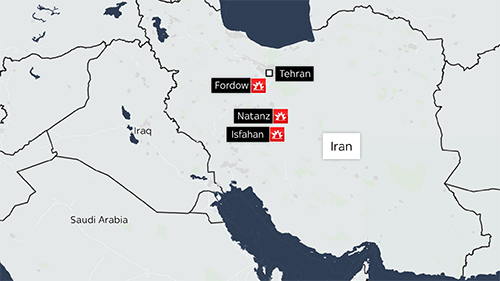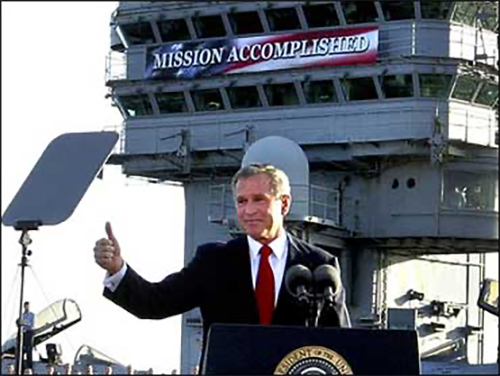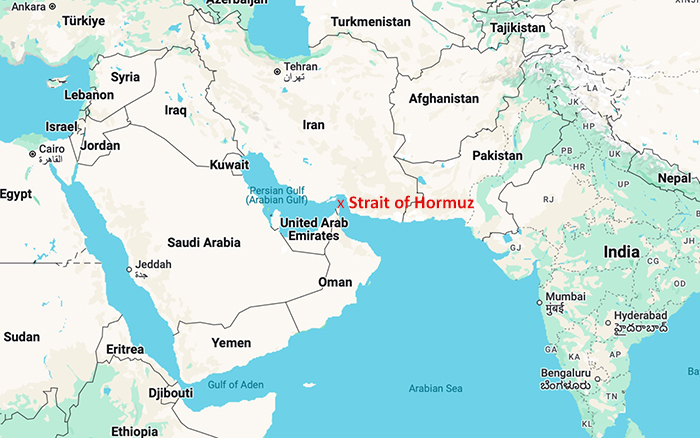

In case you swore off news until we were back on the air, Donald Trump demonstrated that his bomb is bigger than everyone else's bomb by ordering the destruction of Iran's two uranium enrichment sites, Fordo (sometimes spelled Fordow) and Natanz (and a third site, Isfahan). Here they are on the map:

The bombings occurred at 2:30 a.m. Iran time Sunday morning. If Trump followed the chain of command, he would have given the order to Secretary of Defense Pete Hegseth, who probably said he was too busy rooting out trans people in the military to deal with things like wars. Besides, what the hell is a GBU-57 and what do they cost on Amazon? The GBU-57 bomb is nicknamed the MOP (Massive Ordnance Penetrator). If Hegseth was indeed indisposed, for whatever reason, then Trump would have bypassed him and given the order to the Chairman of the Joint Chiefs, Dan Caine. If you are interested in how the bomb works, here is a description in six easy steps.
In news stories, you will read all about centrifuges. What is a centrifuge? Here is the story in brief. Atomic bombs (the easiest nuclear weapons to build) use uranium-235 as the main explosive. U-235 is fissile—that is, it can cause a chain reaction when the nucleus is split and the neutrons emitted hit other nuclei and cause them to split, and so on. Each time a uranium atom splits, it gives off energy. It adds up. Fortunately, over 99% of natural uranium is uranium-238, which has 92 protons, just like uranium-235, but three more neutrons. Uranium-238 is not fissile and can't be used in bombs, so the uranium-235 has to be separated out. This is done by converting the uranium to a gas, uranium hexafluoride, and pumping it into a gas centrifuge, which uses centrifugal force to separate the isotopes based on the microscopic weight difference. The output, a gas with a slightly higher percentage of U-235, is pumped into another centrifuge and then another and another and another until the gas is 90% U-235. The details are classified because the Pentagon doesn't want high school kids building them as science fair projects. The bombed site at Isfahan converts yellowcake uranium ore to uranium hexafluoride gas by mixing the ore with hydrofluoric acid. The resulting uranium hexafluoride gas is then transported to Natanz and Fordo for enrichment using the centrifuges. The Natanz facility also builds the centrifuges. Depending on how good they are, the cascade of centrifuges might have hundreds or even thousands of centrifuges, like these at Oak Ridge National Laboratory:

Iran knew (or, at least, highly suspected) this was coming and may have taken preventive action to minimize the damage. Personnel could have been evacuated and fissile material may have been squirreled away under Ayatollah Ali Khamenei's bed for safekeeping. Moving the centrifuges to a safe location might have been doable if the moving project started early enough. They are individually not that large. We don't know if they were destroyed and neither side is likely to begin telling what they actually know. But even if they were all destroyed, there is a shortcut the Iranians could use to get up to speed (no pun intended): Buy enriched uranium from North Korea.
After the attacks had been completed, Trump gave a brief speech announcing that they were completely successful and Iran's nuclear facilities were obliterated. It was a very unusual speech. Half the speech was devoted to thanking other people! He specifically mentioned Israeli Prime Minister Benjamin Netanyahu, the Israeli military, the U.S. pilots who flew the B2 bombers that delivered the GBU-57s right on target, other U.S. military personnel involved in the mission, Dan "Raisin'" Caine, and God. Hegseth was not mentioned. He probably wasn't even in the loop because Caine really didn't want this one broadcast to the world in advance on Signal.
Trump also warned Iran that it had better make peace now or there would be more bombings, and the remaining ones are much softer targets than Fordo and Natanz, which are buried hundreds of feet under mountains. He didn't mention Joe Biden or the 2020 elections. The speech was the kind any president could have given—short, direct, and to the point. It was probably written by a professional speechwriter and edited by J.D. Vance or Secretary of State Marco Rubio and read off a teleprompter. Here it is. It is only 3½ minutes and worth watching simply because it is so out of character for Trump:
What Trump forgot to do was give George W. Bush a call to ask if he could borrow George's "Mission Accomplished" banner. He might also have asked how well that worked, especially the part about U.S. troops remaining in Iraq for 8 years after the speech and the 4,400 American deaths that resulted from the occupation:

While some countries have condemned Trump, it is also true that last week the International Atomic Energy Agency passed a resolution stating that Iran had breached its nonproliferation agreement and was stockpiling enriched uranium. The director, Rafael Grossi, said: "I've been there, it's half a mile underground."
Yesterday morning, Hegseth and Caine gave a joint press conference at the Pentagon. They tried to issue two contradictory messages at the same time. To Iran, the message was: We have nearly unlimited military power and if you don't do what President Trump orders you to do, we will continue the bombings until you submit to his power. To the MAGA base (which hates foreign wars), the message was: This was a one-shot deal. One and done. War over. We won. They have to hope that each recipient receives the correct message.
One action Iran has already taken is starting to close the Strait of Hormuz, through which much of the world's oil flows. The Parliament voted to close it, but the Supreme National Security Council must approve the decision. If it does, that could cause the price of oil to skyrocket, especially in Asia. It could also lead to worldwide inflation. On the other hand, it would also wreck the Iranian economy, so the Council might reject the law. To save you the trouble of cranking up Google maps to see where the strait of Hormuz is, here it is. It is 62 miles wide. We are a full-service website:

What else Iran will do is unknown. Probably also applies to the Iranian government. Agreeing to full denuclearization with armed inspectors would be humiliating. But not agreeing could lead to more attacks and destabilize the country. One factor it has to consider is that none of Iran's nominal allies, especially Russia and China, have done anything other than issue routine condemnations of the U.S. Whether they would come to Iran's aid in the event of a real war is far from certain. On the other hand, Saudi Arabia simply expressed "concern" about the situation. Maybe the Kingdom hired Sen. Susan Collins (R-ME) as an emergency consultant.
Here is a brief summary of the reactions from the leaders of several other countries/groups:
Chinese leaders are probably struggling to interpret the attack. They have always wondered what Trump would do if China attempted to take over Taiwan by military force. Would they be treated to some TACO? There are surely voices in Beijing now saying there is also a chance he would take action to defend Taiwan.
It is much too early to judge what the political impact will be. Will there be more bombings? Will Iran retaliate by killing Americans or taking them hostage and if so, how will Trump react? By now he is probably cursing himself for not having nominated an actual Secretary of Defense rather than someone attempting to play one on television and not even being a good actor.
A huge factor is whether the strikes actually destroyed the centrifuges. If they did, it was a military victory and Trump will get credit. If the centrifuges were either hidden off site or too deep to be affected, Trump will look like a fool for appointing clowns as DNI and Secretary of Defense. The CIA may not know what really happened for a long time and the public may never know—unless Iran manages to test a nuclear device.
Another big factor is how Iran tries to retaliate and whether the retaliation can be repelled. If some Americans are taken hostage and then tortured to death on camera, many Americans will be asking: "Was it worth it?" If the U.S. now becomes embroiled in a war in the Middle East, those people who voted for Trump because he promised to avoid foreign wars aren't going to be pleased, especially if American soldiers come home in coffins. Although recent polling showed that Americans did not want Trump to bomb Iran—45% against bombing, 25% for bombing, 30% unsure—after a military victory, there is always a rally-round-the-flag effect. But this show has just started. We know how Act I ended, but we have no idea what will be in Act II. Will Iran now negotiate in good faith to avoid more bombings or will it focus on retaliation, and if so, how, and how will that drive public opinion?
Some Democrats are already complaining. Sen. Mark Warner (D-VA), the ranking member of the Senate Intelligence Committee, said Trump acted "without consulting Congress, without a clear strategy, without regard to the consistent conclusions of the intelligence community" that Iran had made no decision to take the final steps to a bomb. If Trump started a war without congressional authorization, that would surely be grounds for impeachment. Congress, not the president, has the exclusive power to declare war. The commander-in-chief gets to run the war, but only after Congress has declared it.
On the other hand, Republican leaders in Congress were quick to praise Trump for his decisiveness. Speaker Mike Johnson (R-LA) said Trump's decision to attack Iran should serve as a reminder that Trump "means what he says" (except for the hundreds of times when he doesn't). In fact, not even this time, since he said he would give Iran 2 weeks to come to the negotiating table and then attacked the next day. Senate Majority Leader John Thune (R-SD) blamed the attacks on Iran. He said: "The regime in Iran, which has committed itself to bringing death to America and wiping Israel off the map, has rejected all diplomatic pathways to peace."
Nevertheless, not all Republicans were on board the S.S. Midnight Hammer. Rep. Marjorie Taylor Greene (R-GA) tweeted: "Israel is a nuclear armed nation. This is not our fight." Rep. Thomas Massie (R-KY) tweeted: "This is not constitutional."
It is probably not lost on Trump that some of the domestic actions he has taken are based on laws that give the president emergency powers during times of war. If the action he took in Iran leads to an actual (possibly after-the-fact) declared war, his domestic actions will have a more solid legal basis. Of course using a war in Iran to deport Mexicans to El Salvador is not exactly what Congress had in mind when writing laws giving the president special emergency powers during wartime. Congress undoubtedly was expecting the president to use the emergency powers to help win the war. Having soldiers tied up occupying American cities is not going to help win a war with Iran. (V)